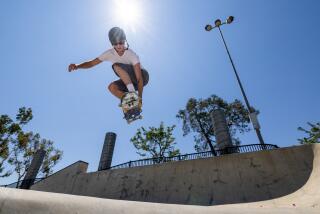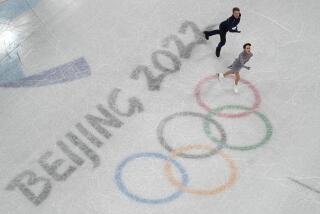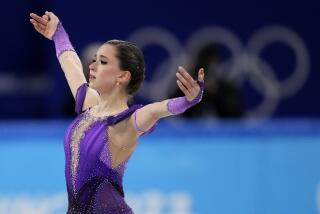Skating May Tweak Grading System
- Share via
Figure skaters’ complaints that the sport’s new judging system punishes risk-taking and rewards safer, simpler moves could result in changes to the scale of points, one of the system’s architects said Thursday.
Ted Barton, a consultant to the International Skating Union, said the system will continue to evolve based on input from skaters, coaches and judges. The cumulative system, in which judges grade skaters on the execution and difficulty of their programs, choreography and basic skills, will be in effect at the Grand Prix Final, which begins tonight at Colorado Springs, Colo. The competition brings together the top skaters from six Grand Prix events this season.
“Spins and footwork have value now, and there are skaters who have exploited that to accumulate points,” Barton said. “Quadruple jumps are worth more than any other jump. Are they far enough away from the other jumps to give those who do a quad an advantage? Maybe not. Maybe they need to be moved up [in value].
“Some skaters have said, ‘I took a risk and tried a quad but those other skaters are so close. Why is that?’ The reason is there are other aspects of skating that are being evaluated. The system is not a jumping system only. It’s all-around. Increasing the difficulty of footwork and spins makes a difference in scores.”
Radical changes in scoring and judging were adopted in response to problems that boiled over at the Salt Lake City Olympics, where French judge Marie-Reine Le Gougne claimed she had been coerced to vote for a Russian pair in a vote-swapping deal that would benefit French ice dancers. She recanted but was suspended for three years and the next Olympics. Anonymity of judges and random selection of scores were incorporated to minimize chances for deal-making; judges are still assessed by the ISU based on records of scores they awarded.
“We have details that need to be improved,” Barton said, “such as the values and levels of difficulty of some moves and to make sure in ice dancing, which is more difficult, that we’ve got the right values. We’ve got 85% of it right on.”
The system hasn’t been approved for the world championships or Olympics but could be adopted at the next ISU Congress, to take place in June in the Netherlands.
Sasha Cohen of Laguna Niguel, who has trained in Connecticut with Tatiana Tarasova the last year, is favored to defend her Grand Prix title in a lackluster field. Cohen, 19, won her three Grand Prix events this fall. Olympic medalists Sarah Hughes, Irina Slutskaya and Michelle Kwan skipped the Grand Prix series.
“I’m really well-prepared,” Cohen said in a conference call with reporters. “I’m doing great programs in practice and I’ve skated against all those girls before. So I feel really good about skating there.”
Evgeni Plushenko of Russia, the 2003 world champion, is the men’s favorite. Tim Goebel, the Olympic bronze medalist and two-time world silver medalist, withdrew because of problems with his skates but said he hopes to find a solution in time for the U.S. championships next month in Atlanta.
Here and There
The Junior Grand Prix figure skating final is taking place this weekend in Malmo, Sweden. Danielle Kahle of Thousand Oaks is a first-time entrant.... Weather has scrambled the men’s World Cup ski schedule. The next event is a giant slalom Sunday that was moved to Alta Badia, Italy, one day after the women compete there.
The luge World Cup series resumes this weekend at Park City, Utah. No U.S. men’s singles competitor has won a medal on the Olympic track, but Tony Benshoof of White Bear Lake, Minn., has won two World Cup bronze medals this season.... Goaltender Chanda Gunn of Huntington Beach is among 36 players invited to the U.S. women’s national hockey team’s training camp Dec. 27-Jan. 4 in Colorado Springs, Colo.
More to Read
Go beyond the scoreboard
Get the latest on L.A.'s teams in the daily Sports Report newsletter.
You may occasionally receive promotional content from the Los Angeles Times.







